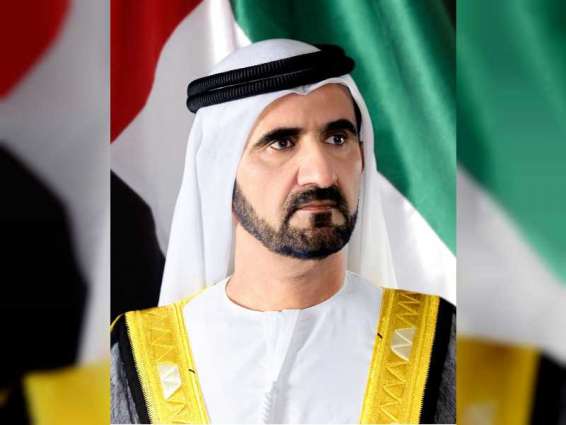DUBAI, (Pakistan Point News - 04th Sep, 2023) The UAE space programme cemented its place in an illustrious club when the Mohammed Bin Rashid Space Centre (MBRSC) today confirmed the successful return of astronaut Sultan Al Neyadi from the International Space Station (ISS), marking the conclusion of the longest Arab space mission in history, which lasted all of six months.
Marking yet another glorious chapter for the UAE that further enhances its standing among major spacefaring nations, the SpaceX Dragon Endeavour spacecraft carrying Al Neyadi undocked from the International Space Station at 3:05 PM (UAE time) on 3rd September 2023, and landed off the coast of Jacksonville, Florida at 8:17 AM (UAE time) on 4th September 2023.
His Highness Sheikh Mohammed bin Rashid Al Maktoum, Vice President, Prime Minister and Ruler of Dubai, said, “I extend my congratulations to the UAE President on yet another milestone in our ambitious space programme’s evolution. As we welcome Sultan AlNeyadi back to earth, I commend him and the entire MBRSC team on the successful completion of this historic mission. In just six years since the launch of the UAE’s Space Pioneers programme, we have celebrated two groundbreaking Emirati space missions. These achievements reflect the UAE's commitment to shaping a brighter future for the world. We have great faith in the potential of our youth and we are confident that our nation’s deep wealth of talent will continue to drive its progress to greater heights. We are resolute in our commitment to build on our achievements to excel as a leader on the global stage."
H.H. Sheikh Hamdan bin Mohammed bin Rashid Al Maktoum, Crown Prince of Dubai and Chairman of The Executive Council of Dubai, said, “The conclusion of this mission marks yet another bright spot in our space journey. The mission's success reflects the commitment of the MBRSC team to bolster the UAE's status as a leader in space exploration. We are dedicated to making meaningful contributions to the progress and wellbeing of humanity, as part of which we continue to forge strong partnerships with global space agencies, research institutions and universities. Sultan Al Neyadi devoted 600 hours to conduct 200 experiments on the ISS, which represent key contributions that further consolidate our nation’s legacy in the global space arena.”
Al Neyadi was received by MBRSC Astronaut Hazzaa AlMansoori, Astronauts Office Manager; Dr. Hanan Al Suwaidi, Flight Surgeon for Al Neyadi; and Saeed AlEmadi, from the Strategic Communication Department at MBRSC, on the recovery ship. A specialised medical team promptly checked his health parameters on site before he headed to a health camp for further tests to gauge his physical condition.
Hamad Obaid Al Mansoori, Chairman, MBRSC, commenting on the successful conclusion of the mission said, “Today marks a historic moment in the UAE’s journey in terms of its continued ambition to explore space. We are grateful to the leadership of the UAE whose visionary aspirations have led to us achieving this ambition and made the space sector in the country what it is today. With Sultan’s success on the ISS, we have set a benchmark for space travel while inspiring future astronauts and aspiring space travellers in the UAE to continue to strive for their dreams to venture into the depths of space.
“The experiments that Sultan has conducted aboard the ISS have helped us expand human knowledge as well as benefit the scientific community worldwide, paving the path for the nation to have new hopes and transcend new realms in this sector. We are glad to have him back on Earth safely and proud of the legacy he has created.”
Salem Humaid AlMarri, Director General, MBRSC, said, “Under the guidance of our leadership, we have completed our first long-term mission, which will set a worthy precedent for the future missions that we embark on. Sultan has created a milestone for the UAE and has inspired every future astronaut and space enthusiast with his mission and the experiments he has conducted aboard the ISS. We are also grateful to Hazzaa AlMansoori who played a key role in this expedition with Sultan as the Increment Lead. Together, our Emirati astronauts have made our nation proud alongside the support of our global partners.”
Adnan AlRais, Mission Manager, UAE Astronaut Programme, MBRSC, stated, “The successful completion of Sultan AlNeyadi’s mission signifies a strategic milestone for the UAE in space exploration. During his time aboard the ISS, Sultan undertook over 200 groundbreaking experiments and conducted the first Arab spacewalk, while his outreach initiatives and consistent communication about his activities in space kept not just the UAE, but the entire world engaged and informed. Sultan's achievements encapsulate the essence of the UAE Astronaut Programme's vision - to inspire, to innovate, and to integrate the UAE into the global fabric of space exploration.”
Safe return to Earth
Sultan AlNeyadi returned to earth aboard the SpaceX Dragon Endeavour spacecraft along with his Crew-6 crewmates, NASA astronauts Stephen Bowen and Woody Hoburg, and Roscosmos cosmonaut Andrey Fedyaev after six months on the International Space Station.
The spacecraft completed its deorbit burn ahead of a splashdown in the Gulf of Mexico off the coast of Jacksonville, Florida. Four minutes before splashdown, the drogue parachutes deployed at an altitude of about 18,000 feet, helping arrest the Dragon’s velocity of approximately 560 km per hour. In less than a minute, the main parachutes deployed at about 6,000 feet, helping the spacecraft make a safe descent.
The UAE Astronaut Programme, one of the projects managed by MBRSC under the UAE’s National Space Programme and funded by the ICT Fund of the Telecommunications and Digital Government Regulatory Authority (TDRA), aims to support research and development in the ICT sector in the UAE and promote the country’s integration on the global stage.




